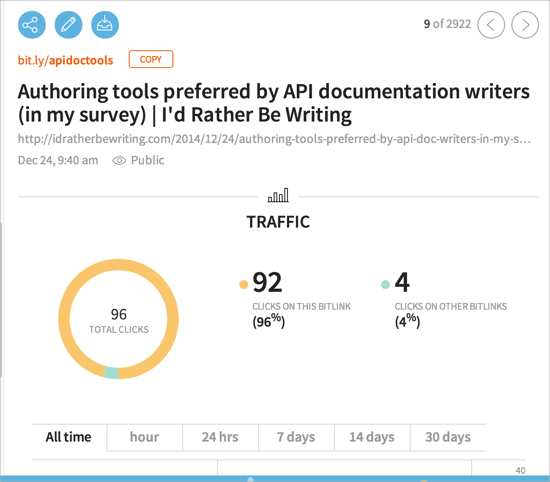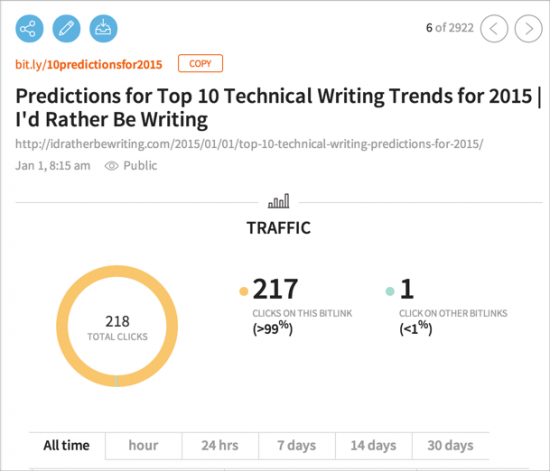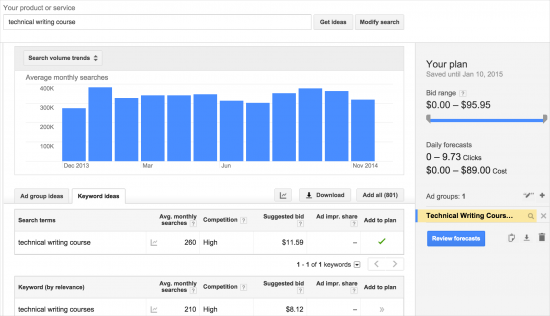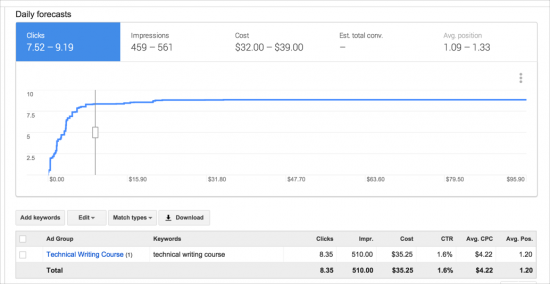New cost-per-click feature for advertising on I'd Rather Be Writing During 2015
I usually renew advertising on I'd Rather Be Writing at the beginning of the year. I just updated my Advertising page with more details. This year I'm hoping to try something new. In the past, I've only done advertising based on the number of impressions. That is, each time my site loads, an ad appears and makes an impression for the year. Over the course of 2014, there were about 588,000 impressions (I equate each page load with one impression).
This year, however, I'm adding the number of clicks as an advertising metric. If you want to drive clicks to your site, I'll help you do this. I'm planning to use bit.ly to track clicks.
With bit.ly URLs, you can see how many people actually click the link. For example, with a post about Authoring tools used by API documentation writers, about 92 people clicked the link that I shared on Twitter: bit.ly/apidoctools.

With my trends post, about 218 people clicked the bitly link: bit.ly/10predictionsfor2015.

I'm not sure how many people clicked the link from Google search results or from their RSS feed, because I am not tracking those hits apart from regular Google Analytics on my site.
Charging per click aligns more with how Google runs their Pay-per-click ads. With Google, let's say you want to have 10 people click a link to your site that surfaces with keyword search results for "technical writing course." This phrase happens to be one of the most searched for topics related to technical writing. Google's keyword planner suggests that you bid $11.59 per click for this ad.

The average number of monthly searches for "technical writing course" is 260k (if you can believe it). The "forecast" for the ad campaign is that you'll need to serve up about 510 impressions to get 8.35 clicks. (And for some reason, the average cost per click in the forecast is shown to be $4.22 -- I'm not sure why the original suggested bid is $11.59.)

This means that for every 100 people who see the ad, 1.6 will click the link. Not such great results.
Different keywords have different rates associated with them. For example, if you wanted to run an ad campaign based on the words "dita editor," Google suggests a bid of $7.86. For "dita standard," the suggested bid is just $0.69 cents per click. (Sorry DITA OASIS committee.)
Google attracts interested parties through their search engine. Someone searching for "technical writing course" is self-selecting as a target audience for ads related to "technical writing courses." In some sense, Google's entire search engine is really just a means of filtering audiences. Getting the right message to the right audience is the main challenge of advertising. The search engine is a brilliant audience filtering mechanism.
I don't have a search engine to filter the world down to a group of people interested in technical writing. Google and other visibility mechanisms (conferences, events) have already done that for me. I have a large community of technical writers gathered through my blog.
Sure, not every technical writer who interacts on my site is interested in "technical writing courses," but they're likely not entirely uninterested. More often than not, I bet more than 1.6 out of 100 people who identify themselves as technical writers and read my site might be enticed to click a link for a "technical writing course," especially if I shared more details about it than a simple 20 word message before the link (as would appear before a Google Adwords link).
For example, instead of a 20 word message, I might review a technical writing course (or enlist someone to guest review it). I might do a podcast about the course, or include a note in the middle of a post related to the same topic, or send out an email newsletter, or hold a giveaway, or write a blog post related to the course.
Additionally, whereas Google's Adword link disappears after your campaign ends, links in my blog remain forever. This adds to general SEO for your site as well, and it gives you lasting returns.
I think that individual niche bloggers, who are known and respected in their communities as thought leaders, will a higher ability to generate clicks related to a specific campaign than Google's general search results page.
(Note that I will appropriately indicate if a link as sponsored (or "promoted," as Twitter calls it) when it is part of a click campaign. Otherwise, my credibility would plummet.)
We'll see how the click campaigns go this year. I am pricing my clicks at at flat rate of $5 per click. If you'd like to try out the click service, let me know. Again, here are more details about Advertising on I'd Rather Be Writing.


